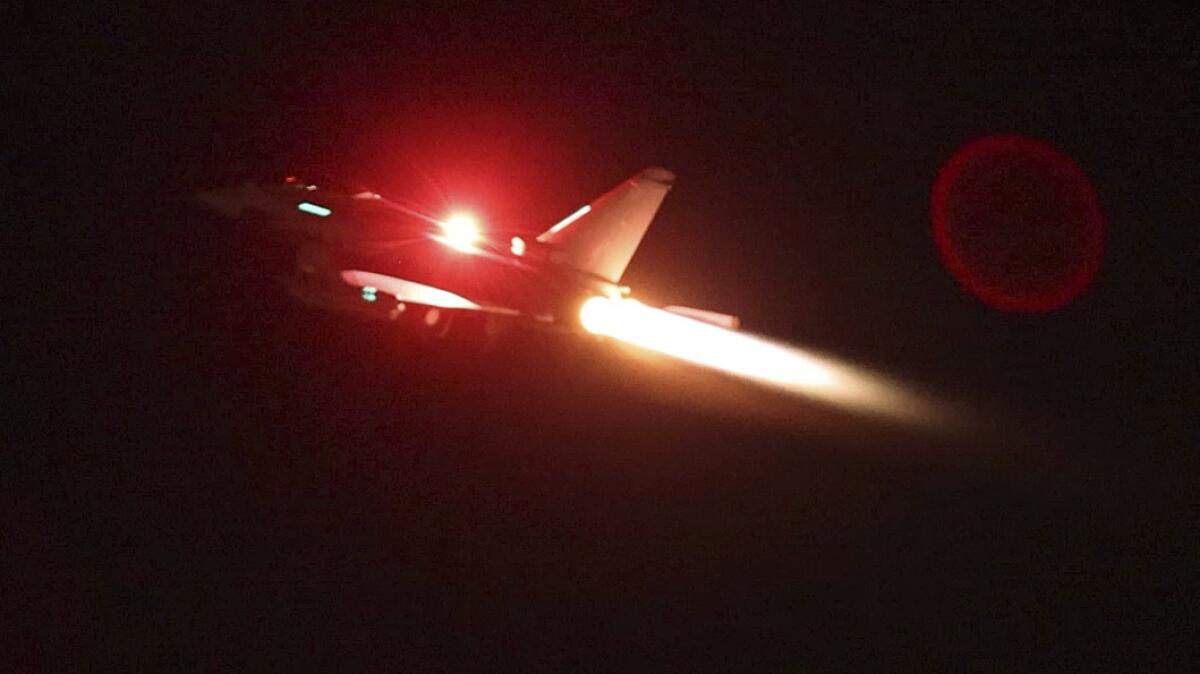Column: Biden is late but right to strike against Yemen’s Houthis

- Share via
With the possible exception of fights over the national debt and Supreme Court nominations, there is no topic that arouses more partisan hypocrisy than presidential use of military force. And globally, there is no issue that arouses more hypocrisy than Israel. Put them together and you have a perfect storm of double standards.
Let’s establish some relevant facts.
On Oct. 7 Iran-backed Hamas launched a brutal attack on Israel, a close American ally, from Gaza. Israel counter-attacked. President Biden repeatedly warned regimes in the region, specifically Iran, not to get involved. On Oct. 24, Secretary of State Antony Blinken vowed America would respond to attacks on American forces, “swiftly and decisively.”
The U.S. and British militaries bombed more than a dozen sites used by the Iranian-backed Houthi rebels in Yemen, in a massive retaliatory operation.
Iran didn’t listen. Iranian-backed militias attacked American bases in Iraq and Syria. In November, Houthis, an Iranian proxy group that controls parts of Yemen, started launching rocket, drone and missile attacks, on both Israel and on international shipping in the Red Sea with support from Iran.
Houthis claimed they were merely attacking ships trading with Israel, but the attacks were indiscriminate, ensnaring ships with no ties to Israel and dislocating global trade. In December, a U.S. warship shot down three drones in self-defense.
Last week, after intense criticism for failing to make good on his warnings, Biden ordered significant attacks on Houthi assets in Yemen, with assistance from Britain and other allies.
Yemen’s Houthi rebels fired a missile, striking a U.S.-owned ship, less than a day after they targeted an American destroyer in the Red Sea.
There isn’t room to catalog the full list of hypocrisies on display, but let’s go through the most obvious. One of the first things Biden did upon taking office was remove the Houthis from the official list of terrorist organizations. He now says they are terrorists.
Many on the right who blistered Biden for dithering are now angry that he didn’t consult with Congress before retaliating. Many on the left, who had no objections to the Obama-Biden administration’s attacks on Libya in 2011, are mad at Biden for attacking a group allied with Hamas.
Globally Israel critics, who make a big show of being supporters of international law, are rallying to the Houthi cause. One chant, heard in New York and London, “Yemen, Yemen make us proud, turn another ship around.” This crowd insists that its animus toward Israel is driven by a passionate commitment to human rights, but seems to have no noticeable objections to Houthi atrocities, including the Houthi restoration of slavery in Yemen.
Anti-Zionism we’re constantly told, has nothing to do with antisemitism. The official slogan of the Houthis is “God is great, death to the U.S., death to Israel, curse the Jews, and victory for Islam.” You can tell me that “death to Israel” is merely anti-Zionist. But “curse the Jews”?
Perhaps because such hypocrisy is so hard to defend, the substance of opposition to the strikes, at home and abroad, is American military “escalation” without required congressional approval (or parliamentary approval in the U.K.). Rep. Pramila Jayapal (D-Wash.) declared, “This is an unacceptable violation of the Constitution. Article 1 requires that military action be authorized by Congress.”
Throughout this crisis, “escalation” has been code for striking back. Even in the immediate hours after Hamas’ butchery, there were demands that Israel not “escalate” by responding. As for America, many opponents of escalation had no problem with Houthi “escalation” by indiscriminately attacking global shipping and threatening American interests.
This illustrates the weakness of the constitutional argument. In 1801, President Jefferson dispatched two-thirds of the U.S. Navy to wage war on the Barbary pirates. He didn’t formally notify Congress until December. As legal historian Robert Turner notes, “the Annals of Congress reveal no expression of concern that the president should first have obtained prior legislative sanction.”
The constitutionally dubious War Powers Act requires congressional authorization for the use of force, except in cases of “a national emergency created by attack upon the United States, its territories or possessions, or its Armed Forces.” Even if, for some tendentious reason, you do not believe the Houthi attacks qualify for the exception, it’s worth remembering they’re just one facet of broader Iranian aggression — and escalation.
I have no problem with getting congressional buy-in, and Biden’s critics have a point: If he was willing to wait this long to respond to the Houthi attacks, he could have consulted with Congress. The problem with Biden is, he shouldn’t have waited this long in the first place.
More to Read
A cure for the common opinion
Get thought-provoking perspectives with our weekly newsletter.
You may occasionally receive promotional content from the Los Angeles Times.













